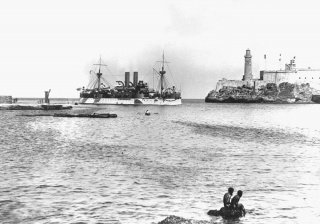 On January 24, 1898, the USS Maine steamed into Havana’s Harbor, under the venerable watch of the Morro Castle and anchored close to the Spanish cruiser Alfonso XII and the Ward line steamer City of Washington.
On January 24, 1898, the USS Maine steamed into Havana’s Harbor, under the venerable watch of the Morro Castle and anchored close to the Spanish cruiser Alfonso XII and the Ward line steamer City of Washington.
The USS Maine had been sent to protect American citizens in response to the U.S. Consul in Havana Fitzhug Lee request, who for several weeks had witnessed the violence led by Spanish army officers and merchants against the Cuban new autonomist government. On January 1, 1898, the Spanish autonomist government took office in Cuba with the formal investiture of José Maria Gálvez as Prime Minister. Angry mobs roamed the streets, chanting slogans and denouncing as traitors those in favor of autonomy and a negotiated settlement of the war in Cuba.
President William McKinley was shocked by the news that some Spanish army officers had led the riots and ordered the Department of the Navy to deploy a warship to Havana.
The first Sunday after its arrival, the Maine’s 52-year-old captain, Charles Sigsbee, joined Lee and a group of officers at the bullfights in Havana, where the famous matador Mazzantini (“El Torero”) performed before a roaring crowd. They were provided a ringside seat and a detachment of Spanish soldiers for protection, a wise decision given the crowd’s hostile anti-American attitude.
The Maine was an example of the rebirth of the U.S. Navy, that had been declining since the end of the Civil War (1865). In 1890, the U.S. Congress authorized the construction of four battleships, the Oregon, Indiana, Iowa and Massachusetts, and several cruisers. The ships were finished just in time for the Spanish-Cuban-American War of 1898. Without their heavy guns and thick armor, the U.S. Navy could not have waged an overwhelming swift war against Spain.
Three days after the Spanish riots that sent the Maine steaming into Havana, the American Ambassador in Madrid, Gen. Stewart L. Woodford, met with Queen Maria Cristina. She discussed enforcement of sweeping reforms in Cuba, insisting that her government was interested in a peaceful settlement to the conflict. Woodford told the Regent Queen that the recent riots were a disturbing situation. “The mutiny in Havana does not look as if Captain General Ramon Blanco can control his own army. If he cannot control his own army, how can he hope to crush the rebels? And besides, I hear every day of mutinies here in Madrid.” Maria Cristina replied, “I will crush any conspiracy in Spain. Upon this you may rely. I believe that my government will keep peace in Havana and reduce army officers to obedience. I want your President to keep America from helping the rebellion until the new plan of autonomy has had a fair chance.”
McKinley appeared willing to accept Maria Cristina’s request to give autonomy a “fair chance.” In his annual address to Congress a few weeks earlier, the President clearly stated the need to give Spain a “reasonable chance to realize its expectations….” On this issue Woodford informed the State Department, “the Spanish Minister of State is greatly gratified with the generous tenor of the President’s message, and today authorized me to express his gratification to my government….”
William McKinley was a cautious politician, naturally disinclined to make rash decisions. For a time it seemed likely that the Queen Regent would get her “fair chance.” But it was not to be. In less than 30 days, the United States and Spain were at war.
On February 15, 1898, a terrible explosion rocked Havana; the “Maine” had blown up and sank. The USS armored cruiser that on January 24 steamed into the Harbor as a response to the rioting in Cuba, was torn in half by the explosion. How it happened is still being debated, but the tragic destruction of the “Maine” became the spark for war.








